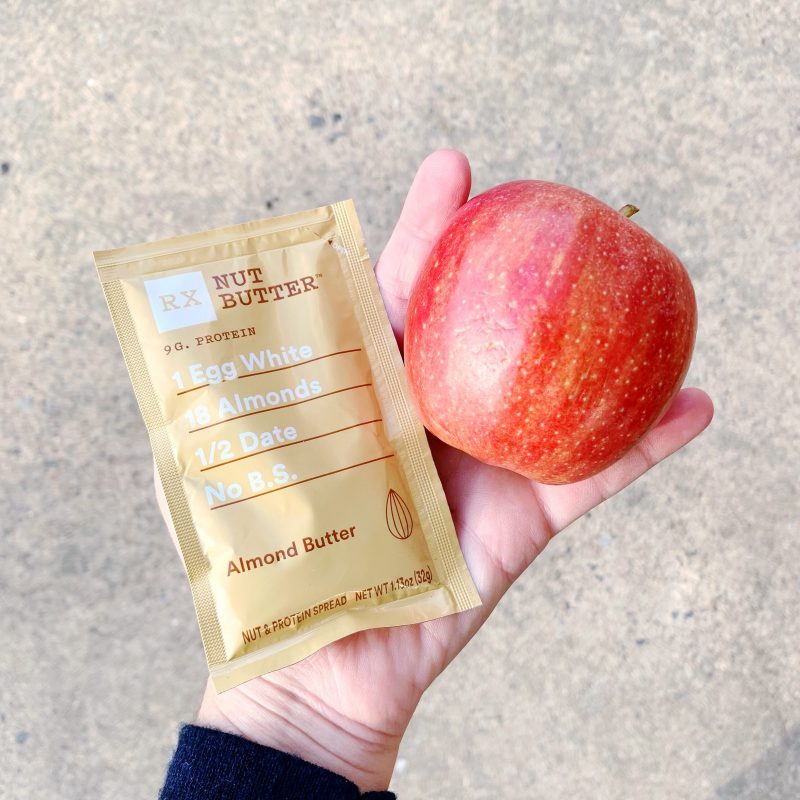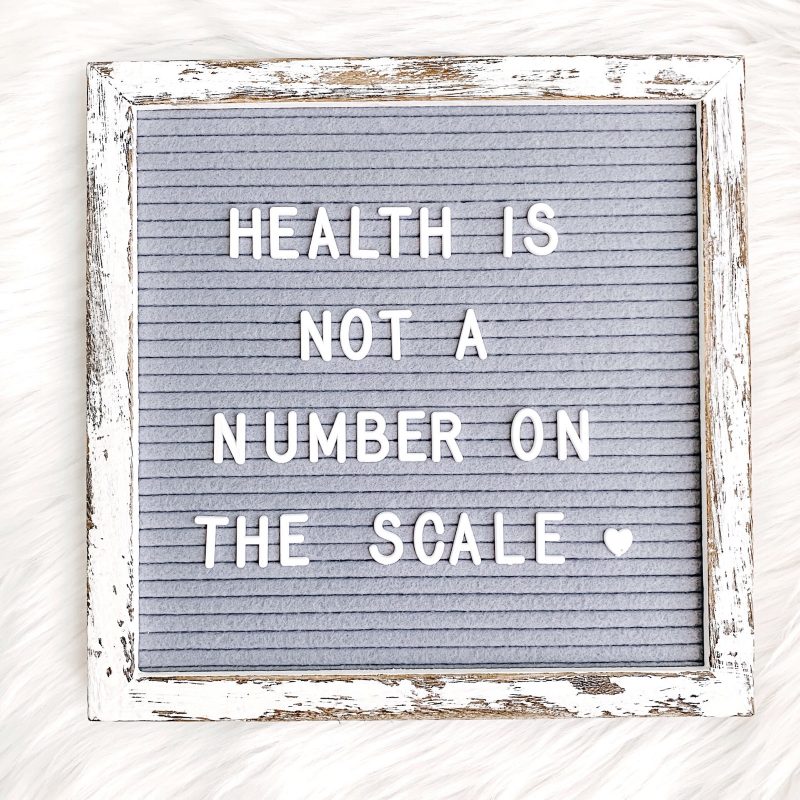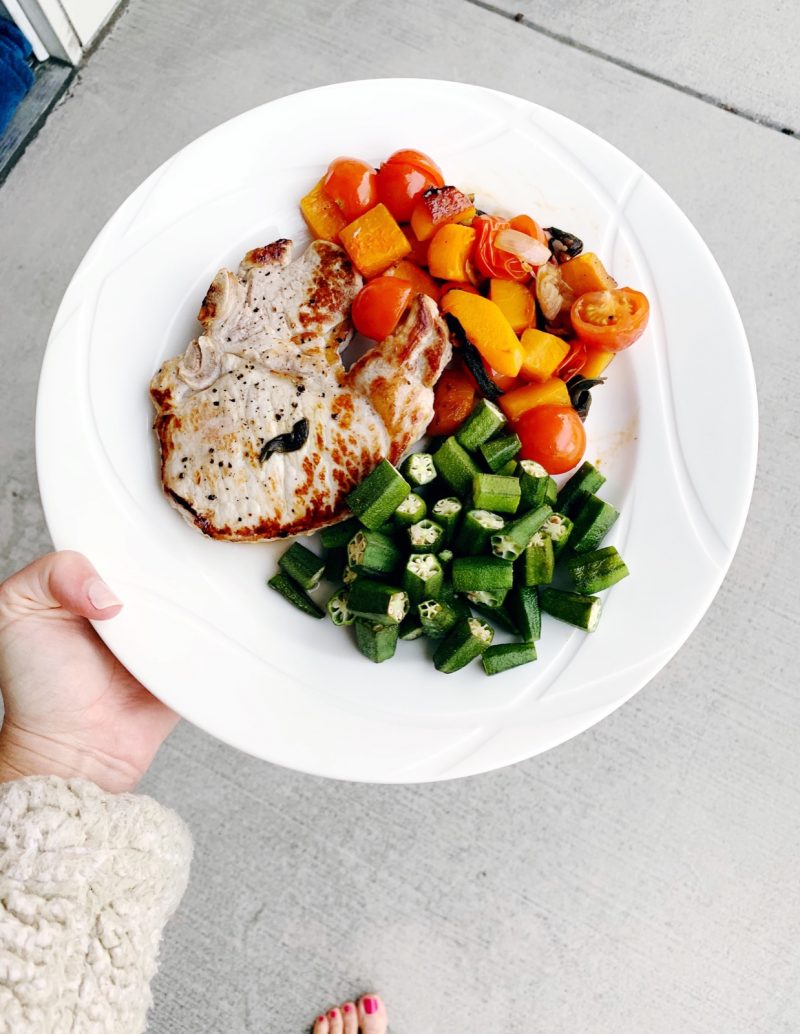Five Questions With is becoming a favorite series for me – I love sharing the things I love and my own routines, but there is so much content I want to share with you from experts I’ve connected with.
One of my readers, Samara Abbott, is a registered dietitian and owner of G&G Nutrition Co. We’ve been chatting on IG via DM for years now and I asked her to contribute this post because I love her outlook on health, nutrition and wellness. Samara has worked in the field of nutrition for 11 years and specializes in prediabetes and polycystic ovary syndrome (PCOS). Thank you for joining us today, Samara!
What are some small, simple things women can do to improve their overall nutrition?
I recommend that women bring it back to basics when it comes to nutrition. A lot of my clients come to me feeling like eating well is very complicated… but it doesn’t have to be! The average person is not eating enough fruits, vegetables, and whole grains, and all of those groups build the foundation of a healthy diet.
There are a few other things women can do to set themselves up for success with nutrition. One is making sure you’re getting enough protein at breakfast. The average person gets more than enough protein in total, but studies show that evenly distributing it throughout the day creates more balanced eating habits and helps decrease evening snacking. Aim for 15 grams of protein that comes from whole foods like nuts, nut butters, seeds, whole grains, eggs, yogurt, and milk.
Another simple thing is to remember that fiber, healthy fat and protein are the building blocks for healthy, satisfying meals and snacks. I find that many women often plan their meals around what will be lowest in calories, and then they beat themselves up for not having the “willpower” to stop themselves from excessive snacking when they feel hungry. You’re much better off to just have a balanced meal to begin with. For example, a smoothie with almond milk, spinach and 1/2 banana is a great source of vitamins but it’s not the right mix of macronutrients to be sustainable. A few changes you could make to give that smoothie more staying power could be switching the milk out to cow’s milk or soy milk, adding in some greek yogurt or adding a fat like half of an avocado or some peanut butter.
 What are the most common questions/concerns/struggles you hear from your clients?
What are the most common questions/concerns/struggles you hear from your clients?
The biggest struggle I hear from clients is dealing sugar cravings. Many clients come to me in a place where they feel like they can’t control themselves around sweets or they have a trigger dessert food that they binge on. Their solution is to avoid the specific trigger item, specifically by not keeping it in their homes. If you feel like you can’t keep a pack of cookies in the house because you’ll eat the entire container then there’s likely something deeper going on.
Struggling with craving sweets (also known as simple carbohydrates) can happen because of so many different reasons. The biggest thing I see with clients is either insufficient carbohydrate or calorie intake, or there’s a lot of restriction going on in the diet. Other causes can include inadequate sleep, poor stress management or disorders involving insulin resistance such as prediabetes, diabetes and polycystic ovary syndrome. In order to resolve this struggle, the underlying issue needs to be addressed. This is not an overnight process, but it is also very freeing to not feel like a food has power over you.
 What do you think about diet tends like keto, paleo, intermittent fasting, intuitive eating, etc?
What do you think about diet tends like keto, paleo, intermittent fasting, intuitive eating, etc?
There are so many diets out there, and if you’ve found one that works for you then that’s great. Definitely do what makes you feel your best. But research shows us that diets don’t last in the long run and most people who follow a diet for weight loss end up eventually regaining all of their weight back. This is known as weight cycling, and it’s linked to increased mortality as well as insulin resistance.
Here are some questions that are worth asking yourself if you’re thinking about following a diet:
- Are these nutrition changes something that you will be able to follow permanently?
- Will following this diet still allow you to experience social settings in an emotionally healthy way, such as enjoying a dinner out with friends or having a slice of cake at a birthday party?
- Can you still include your favorite foods on this diet?
If the answers to these questions are no then definitely ask yourself how following that diet will benefit you. It probably won’t.
We’re surrounded by a multi-billion dollar diet industry that makes us feel like we need a set of rules to tell us what we should and shouldn’t be eating, so the structure of following a diet makes us feel more in control. This may seem great at first, but there are a ton of issues with this in the long run. Diets also don’t take into account our food preferences, busy schedules, income, life stressors, hormone imbalances, gut health, or our specific nutrient needs related to activity, body composition or health conditions. This is why they’re hard to stick with.
I am much more of a fan of mindful eating, which includes understanding how to properly nourish your body while still maintaining a healthy relationship with food. The first step in this is learning the basics of nutrition and how food is used in the body, and then from there you can use this knowledge to make your own decisions about how you would like to eat. Learning how to eat mindfully puts you in the drivers seat of your own diet. The idea of not having food rules feels scary to many women, but letting go of all of the restriction around food frees up mental space to enjoy the more important parts of life.
Veronika’s question also mentioned Intuitive Eating. I love the concepts of Intuitive Eating and I highly recommend reading the book by Evelyn Tribole and Elyse Resch. Intuitive eating is not a diet and it’s not intended to be a tool for weight loss. The book does a great job of explaining how diet culture has negatively impacted how we trust our intuition around food.
Social media has really misrepresented the concepts of Intuitive Eating to make it seem like it’s centered around eating when you’re hungry and stopping when you’re full. The discussion of hunger and fullness is actually only a small part of the book. I’ve had so many clients tell me reading it changed their life and their entire attitude around food and dieting. I highly recommend it!
 What are the most successful approaches you’ve seen to maintain a long term lifestyle change?
What are the most successful approaches you’ve seen to maintain a long term lifestyle change?
The most successful approach I’ve seen to making long term nutrition and exercise lifestyle changes is to just address one small area at a time. It’s fairly common when someone decides to be healthier that they go all-in and try to overhaul all of their eating and exercise habits at once. While this motivation is great, it can also create unrealistic expectations that are difficult to stick with. This “all in or all out” mentality can be a huge road block to creating long term lifestyle change.
Instead, take a step back and ask yourself – what is one small area where I can focus on that would be really impactful? Maybe it’s working on restructuring your breakfast macronutrients, trying to cut back on sugary beverage intake or starting an exercise routine. Pick something you feel ready to work on. Approach the area in a way that involves curiosity, flexibility and trial and error. Give yourself time to really create a change that makes you feel good. Let that develop into a habit before you move on to another area.
It’s also really important to set goals that are focused on internal motivating factors. I find many clients start out by having a goal involving weight loss or fitting into a specific clothing size. Weight is an outcome, not a behavior, so fixating on a number on the scale is a hard starting point for lifestyle change. Instead, try to dig deeper and address internal factors – better sleep, great energy, stress management, physical endurance, etc.
I would also strongly recommend evaluating whether there are any emotional or psychological factors preventing you from living a healthier life. Anxiety, depression, PTSD, difficult childhoods or even poor relationships with those close to us can cause deeply-rooted eating issues. Working on those issues with a therapist can be huge in creating healthy habits because they are healing the root of the issue.
Why do you think our generation is so invested in and interested in nutrition and wellness?
Wellness and nutrition are things that every single person has in common. They affect our day-to-day lives as well as our health. The average American receives very little nutrition education in school yet we hear a lot about nutrition topics in the news. So I think it’s only natural to want to learn more about the topic.
We also live in a society that puts a lot of emphasis on weight, weight loss and physical appearance. This can create a lot of insecurities, and we’re surrounded by a multi-billion dollar diet industry that capitalizes on those insecurities. Social media can also be largely influential as well. You can’t scroll through Instagram without seeing exercise and nutrition tips.
Given all of this, we need to make sure our invested interest in our nutrition and wellness remains healthy and balanced. Don’t be afraid to tune out messaging that doesn’t resonate with you or unfollow social media accounts that don’t make you feel good about yourself. Our bodies are naturally different shapes and sizes, and it’s perfectly normal and healthy for our weight to change throughout life.
As women, there are so many ways we can use our interest in nutrition and wellness in a positive way. We can raise healthy eaters by offering children a variety of different foods and allowing them to choose what and how much they want to eat. We can add nutrient-dense foods to family get-togethers while still including savory dishes. We can plan wine and bachelor nights, and also organize gatherings that involve more physical activity. We can steer conversations away from weight and negative self-talk and more towards self care and compassion.
Thank you so much for this guest post, Veronika!
About Samara
Samara Abbott, MSEd, RD, LDN is a registered dietitian nutritionist and owner of G&G Nutrition Co. She helps working women take steps towards the healthiest version of themselves through balanced nutrition and simple wellness. Samara has worked in the field of nutrition for 11 years and specializes in prediabetes and polycystic ovary syndrome (PCOS). She has been featured in US News & World Report, Women’s Health Magazine, Eat This, Not That, and has made appearances on Charlotte Today and WSOC-TV. Samara chronicles her nutrition, life and current home renovation adventures on her blog, Grapefruit & Granola. She loves connecting with readers on Instagram.

Do you plan on integrating any of her advice into your own life? She talks a lot about sweet cravings which you admit to have, she also talks about how mental health impacts diet. Just out of curiosity wondering how you feel you fit into her pendulum!
I think Samara’s advice is wonderful!
I significantly changed my diet in the last year and am really happy with the 80/20 approach I have. I also have done numerous things to address my mental health, which I’ve talked about extensively on my blog. Exercise really helps me with my mental health as well! Thanks for your comment!